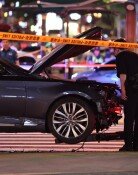1st Provisional Budget
President Lee Myung-bak ordered the government Thursday to form a provisional budget because the passage of the budget bill for next year is unlikely within this year. The Constitution allows the government to form an emergency budget within the amount of the previous years budget if the new fiscal year begins without parliamentary passage of a new budget bill. If the National Assembly fails to pass the bill by years end, a Cabinet meeting on New Years Day will decide on an emergency budget. The provisional budget system was introduced in 1960 as a contingency measure in case the governments function was suspended due to a national emergency, but has never been implemented. Public confusion is expected from the beginning of next year.
The provisional budget has its limits. Only organizations and facilities set up under the Constitution and laws can use the budget. On this, President Lee suggested deferring wage payments to public officials if the government operates with the provisional budget. The projects whose budget has been approved will continue next year. Among infrastructure construction projects for which 24.8 trillion won (21 billion U.S. dollars) has been allocated, the share of such projects accounts for 20 percent. This means the remaining 80 percent of infrastructure construction will not begin next year.
The provisional budget only allows the government to spend money on state administration. So the working and middle class will be hit the hardest. The Strategy and Finance Ministry said a system that allows students to repay their loans after landing jobs, a new pension system for people with severe disabilities, and financial assistance for low-income families through bankbooks cannot be implemented. The expansion of childcare subsidies for dual-income households and families with disabled children will also be impossible. Policy projects to provide jobs for youths and homes for low-income households will also be suspended.
Korea has lifted itself from the global economic crisis faster than any other country largely due to fiscal spending. If government spending is not implemented in time, this will deal a huge blow not only to the economy but also to the country`s international credibility.
The budget for the four-river restoration project, which opposition parties have opposed by occupying the National Assembly, accounts for a meager 1.2 percent of the government budget of 291 trillion won (247 billion U.S. dollars). Adjustment of the budget for the river project should be done by the Special Committee on Budget and Accounts, not through negotiations between ruling and opposition parties. The main opposition Democratic Party demands talks between party leaders while boycotting the budget committee. Deliberation on budget bills is the duty of lawmakers. Legislators from both the ruling and opposition parties are turning a blind eye to the people`s livelihood by fighting over contentious budget bills while delivering on other budget bills with little attention. The people are sick and tired of chronic disputes over budget bills.







